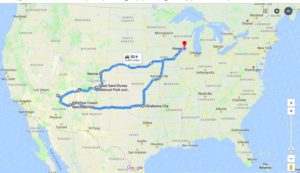My husband and I are nomads at heart. But we also want our kids to have a stable childhood.
So, to satisfy our need to stay put and our need to keep moving, we bought a house we’ll live in until our children are grown, and then consciously decided to prioritize traveling.
Here’s the thing, though: While our desire to travel is endless, our budget for travel is not.
Typically, we take two major trips a year.
This year, it’s the Grand Canyon and a cruise. Last year, it was an anniversary trip (sans kids) to the Grand Tetons and a family week in New Orleans.
San Diego and Yellowstone, England and Texas, Gatlinburg and Disney World …
We make the rounds.
So, through trial, error and a bunch of research, I’ve discovered several tips and tricks that make vacationing more affordable but just as fun. (In fact, we often use our savings to pay for experiences we otherwise couldn’t afford.)
Here’s how we do it.
DRIVE, DON’T FLY
This, seriously, will save you hundreds — often, thousands — of dollars. Especially if you have multiple children.
With three school-aged kids, we need to buy five tickets anytime we fly. And any air fare multiplied by five = a boatload of money. (A $200/person flight = $1,000).
That’s just to get to the airport.
Frequently, then, you have to rent a car at your destination, which easily can tack on another $600-plus per week.
For our trip this summer to the Grand Canyon and Rocky Mountains, we will travel about 3,500 miles. I’m estimating that will cost us about $450 in gas.
If we were to fly and rent a car, we’d be spending $2,293 for the same trip: $1,405 for the cheapest flight, plus $888 for a sedan (also far less roomy than our minivan).
That’s money you can pocket … or use to splurge on something awesome you otherwise couldn’t do.
For us, we’re using our “savings” to fund a helicopter ride over the Grand Canyon, which we’ll appreciate far more than a trip in a 747 from O’Hare to Salt Lake City.
(Not sure about all that extra time in the car? Make the journey part of the vacation. On the way to and from things, we’ve gone to amusement parks, zoos, the Louisville Slugger museum, the National Civil Rights Museum, the St. Louis Arch … . It’s really all part of the fun.)
SAVINGS: $1,800
CAMP
I get it — Camping’s not for everyone.
It can, however, save you hundreds of dollars, and you don’t even need to “rough it” in a tent.
Five years ago, my husband and I bought a pop-up camper, for about $3,000.
We recouped that initial investment a long time ago.
We’ve camped all across Wisconsin in our pop-up, spending between $20 and $30 a night to stay in state parks instead of $100+/night at hotels or Airbnb’s.
Our camper is also how we travel on cross-country trips. For convenience, we might stay in the occasional hotel. But mostly, we camp.
How much does it save us? Check this out:
Camping in Yellowstone costs between $26 and $31 a night for reservable sites. Camping for an entire week there will cost you $182, in peak season, at a site with flush toilets, showers and electricity.
That same week, staying just outside the park in West Yellowstone, Wyo., will cost you $1,330, at the cheapest of hotels.
SAVINGS: $1,148
VACATION LIKE YOU LIVE THERE
Pretty much everywhere you go, you’ll find people who live in that place who also like to do stuff.
So, find out where those people are and what they’re doing.
Maybe the newspaper has restaurant reviews.
Local bloggers always know the best parks, play places and kid-friendly restaurants, and invariably give information on places you won’t easily find on Yelp.
The City Moms Blog has developed an impressive network of city-specific sites around the country. Check them out for recaps of the best playgrounds and family events in the places you’re headed.
I’ve generally soured on Trip Advisor. But their travel forums are useful.
And local visitor bureau and entertainment websites (like Madison’s Isthmus) have event listings for local street fairs, festivals and the like.
That’s how we ended up watching a horse parade in Dubois, Wyo., and collecting colorful beaded necklaces at a (kid-friendly) Mardi Gras parade in New Orleans. And I (half-) jokingly call our trip to England “The Great UK Playground Tour of ‘16,” because everywhere we went, we’d spend at least an afternoon on monkey bars, zip lines, climbing frames and swings.
The best part of vacationing like a local?
Most of it is FREE!
(Bonus tip: Before going anywhere, I Google “free things to do in (name the place)”. Sure, some things sound like a snoozefest. But you also may discover a free tour of the U.S. Mint in Denver. You can literally see how they make the money. How fun is that?!?!?!)
My advice: Choose two or three “touristy” things to do per trip, which tend to cost more money. Then offset that cost by by incorporating a few days of free fun.
SAVINGS: About $150/day
AVOID PEAK SEASON
“Travel during the off-season” is standard money-saving advice.
But here’s a secret — You also can have a much better vacation by traveling when others aren’t.
Have you ever been to Disney World in summer? It’s 95 degrees and crowded, and everyone’s miserable.
Disney World in January … . That was kind of great.
Yes, the water slides were closed, and the temperatures were fairly cool.
But putting on a light jacket in the evenings was a small price to pay for being able to walk around comfortably with minimal crowds and short lines for all but the most-popular attractions.
I’d never do Disney at peak season.
The challenge, of course, is that if you have children in school, traveling in the off-season can mean your children miss a few days of class.
For us, it’s a compromise we’re willing to make. Sometimes. At least at the elementary-school age.
SAVINGS: Varies
In addition to these “big ticket” ideas for saving money, there are a lot of things we do to limit spending along the way.
— Pack lots of food. Eat as cheaply as possible as much as possible: Cereal for breakfast, fruit for snacks, sandwiches for lunch. Then you can eat out a few times during your vacation without any financial guilt.
— Research deals ahead of time. Groupon, Living Social, CityPASS and Go City cards. Individual websites also may offer online coupons or give you a cheaper price for buying early.
— Check out your membership perks. AAA membership gets you discounts on gas, hotel stays and more. Sometimes your employer offers perks, especially if they outsource their human resources department. We bought (slightly) discounted Disney World tickets that way.
— Haggle. I just haggled $300 off an upcoming tour we’re taking. Was I comfortable doing it? No. Was saving $300 worth the effort? Umm, yes! If you’re too timid to haggle in person, try it in writing, via email or those live customer-service chats that sometimes pop up on websites.
— Get last-minute hotel deals. Whenever my friend travels and is ready to stop for the night, she just uses an app like Priceline to find a good deal nearby. She never pays more than $50 a room.
You can go overboard with this cost-saving stuff. You don’t want to be so frugal that you don’t enjoy your vacation.
But why spend more than you have to?
With a little flexibility and a little planning, you can save a bunch of money and still have a wonderful vacation. Bon voyage.
















Good thoughts. I agree with a larger family, driving is a better alternative. I believe you’ve overlooked the cost of housing a camper, insuring it and maintaining it. It can be less expensive, but there is a cost involved with that as well. Also, vacationing without kids can be costly–child care while you’re away.
We are doing a similar trip this summer and I’d love to know what your other major destinations were on the map above!
Driving for trips costs a lot more that just gas money – wear and tear on your vehicle, more frequent oil changes/maintenance. Not to mention additional time you have to take off of work for travel time.